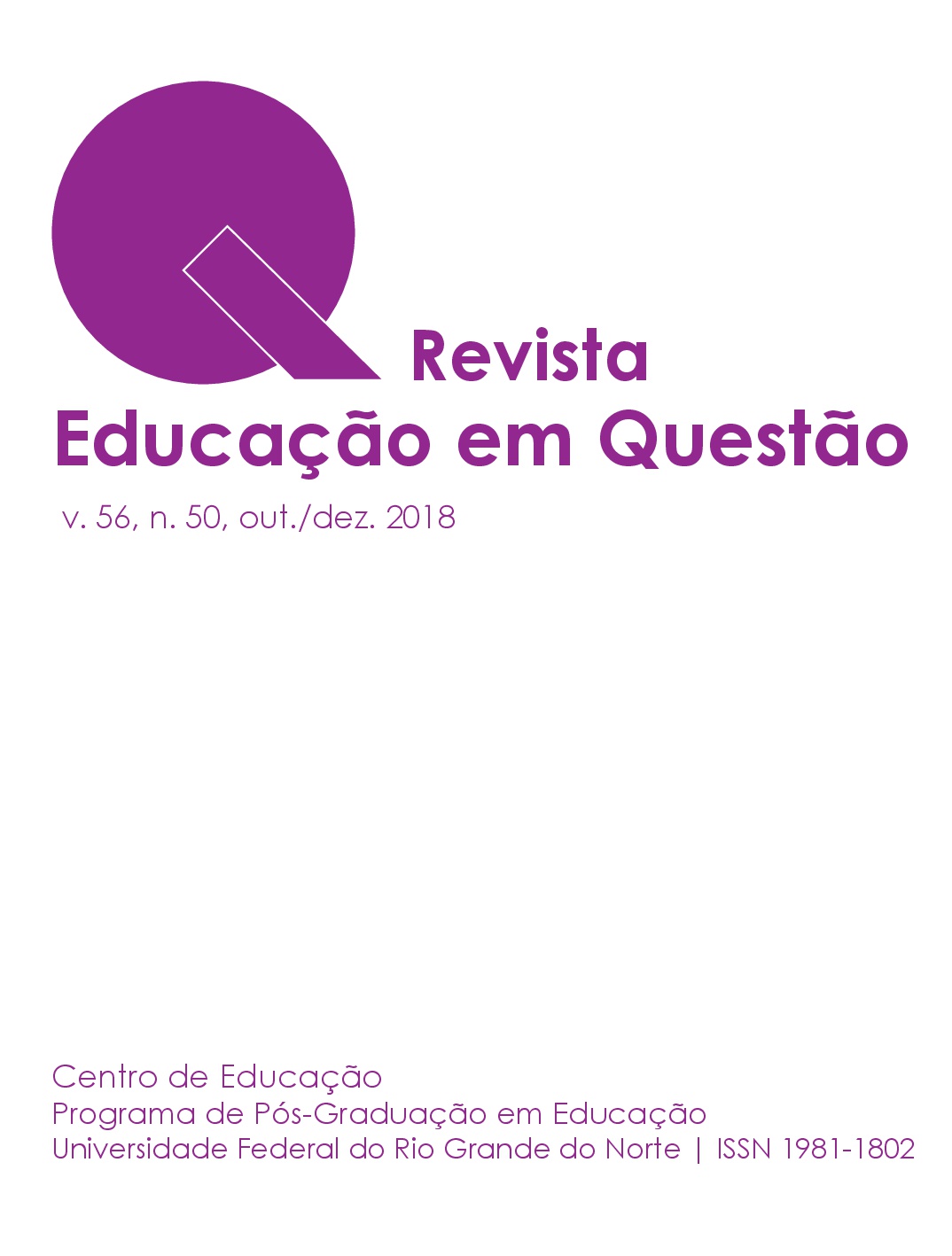Negação da política e politização da educação:
a prática discursiva do Movimento Escola sem Partido
DOI:
https://doi.org/10.21680/1981-1802.2018v56n50ID14483Palavras-chave:
Escola sem partido, Disciplinarização, Currículo, CorporeidadeResumo
Neste texto nossa intenção é situar o discurso elaborado pelo Movimento Escola Sem Partido (ESP), que objetiva construir determinada narrativa acerca de temas importantes na educação, especificamente no campo do currículo. Em sua ação ideológica, o ESP defende a despolitização da escola, a separação entre formação e ensino e o discurso sobre o controle da corporeidade, enfatizando as questões de identidade e gênero. Ao tratarmos do movimento em perspectiva histórica, o faremos a partir de dois momentos cruciais para a construção da hegemonia da direita. Inicialmente, recuperamos aspectos importantes do processo de construção do discurso, fundado na racionalidade técnica, elaborado pelo Instituto de Organização Racional do Trabalho (IDORT) na década de 1930. Na sequência, analisamos aspectos que marcaram a construção da ação política do Instituto de Pesquisa e Estudos Sociais (IPES) na década de 1960, sua ação ideológica e as teses que defendeu. Por fim, retomamos ao ESP, e procedemos à análise de algumas das teses que defendem e os limites que elas expressam.
Downloads
Referências
AÇÃO EDUCATIVA (Org.). A ideologia do movimento Escola Sem Partido. 20 autores desmontam o discurso. São Paulo: Ação Educativa, Pesquisa e Informação, 2016.
ANTONACCI, MariaAtonieta Martines. A vitória da razão? O Idort e a sociedade Paulista. São Paulo: Marco Zero/CNPq, 1993.
DREIFUSS, René Armand. A conquista do Estado – Ação política, poder e golpe de classes. Petrópolis: Editora Vozes, 1981.
EAGLETON, Terry. As ilusões do pós-modernismo. Tradução Elisabeth Barbosa. Rio de Janeiro: Jorge Zahar Editor, 1998.
FRIGOTTO, Gaudêncio (Org.) Escola “sem” partido: esfinge que ameaça a educação e a sociedade brasileira. Rio de Janeiro: EdUERJ/LPP, 2017.
INSTITUTO de Pesquisas e Estudos Sociais. A educação que nós convém. Rio de Janeiro: Apec, 1969.
MELO, Demian Bezerra (Org.). A miséria da historiografia ? Uma crítica ao revisionismo contemporâneo. Rio de Janeiro: Consequência, 2014
MORAES, Carmen Sylvia Vidigal. O ideário republicano e a educação: o Colégio “Culto à Ciência” de Campinas (1869-1892). 1981. Dissertação (Mestrado em Educação) – Programa de Pós-Graduação em Educação, Universidade de São Paulo, São Paulo, 1981.
ALMEIDA, Stela Borges de. Educação, história e imagem: um estudo do colégio Antônio Vieira através de uma coleção de negativos em vidro dos anos 20-30. 1999. 284f. Tese (Doutorado em Educação) – Programa de Pós-Graduação em Educação, Universidade Federal da Bahia, Salvador, 1999.
NIQUITO, Thais Waideman; SACHSIDA, Adolfo. Efeitos da inserção das disciplinas de filosofia e sociologia no ensino médio sobre o desempenho escolar. Rio de Janeiro: IPEA, 2018. (Relatório de Pesquisa para impressão).
PAULO NETTO, José. Pequena história da ditadura brasileira (1964-1985). São Paulo: Cortez Editora, 2014.
SINGER, André. Os sentidos do lulismo: reforma gradual e pacto conservador. São Paulo: Companhia das Letras, 2012.
Downloads
Publicado
Como Citar
Edição
Seção
Licença
À Revista Educação em Questão ficam reservados os direitos autorais no tocante a todos os artigos nela publicados.
A Revista Educação em Questão reserva-se ao direito de não publicar artigos e resenhas de mesma autoria (ou em co-autoria) em intervalos inferiores há 1 (um) ano.






